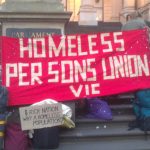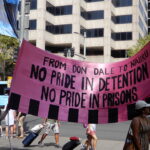Curbing Rising Strip Searches: An Interview With the Safe And Sound Campaign’s Samantha Lee

Over the last half decade, reports have indicated that the use of strip searches by NSW police following a positive indication from a drug detection dog has been become more routine. This is especially disconcerting as sniffer dogs get it wrong two-thirds to three-quarters of the time.
Then it became apparent last July that the police have recently been ramping up their use of this invasive practice in relation to its drug dog operations.
Figures obtained by NSW Greens MLC David Shoebridge via freedom of information (FOI) laws revealed that the number of strip searches conducted by police following a dog indication have almost doubled: up from 590 in 2016 to 1,124 in 2017.
The state’s sole police oversight body, the Law Enforcement Conduct Commission (LECC) announced in October that it’s conducting an investigation into allegations that some police officers have been abusing their strip search powers.
While in mid-November, Aboriginal Legal Service (ALS) Western NSW deputy principal solicitor Emily Winborne revealed that police officers have been searching Aboriginal children as young as 11 years old. And in some cases, strip searches are being conducted illegally.
And right before the holiday break, Mr Shoebridge released further figures that revealed over the last four years, the use of strip searches in general by police has risen by 47 percent. And on average, these searches are turning up no illegal items or substances 64 percent of the time.
The laws as they stand
The Law Enforcement (Powers and Responsibilities Act) 2002 (the LEPRA) contains the laws pertaining to strip searches.
Section 31 provides that a strip search can be conducted when an officer “suspects on reasonable grounds that the strip search is necessary for the purposes of the search”. And when it’s not carried out in a police station, the officer must also find the “seriousness and urgency of the circumstances” deem it necessary.
Section 32 of the LEPRA stipulates that an officer must inform the subject of the strip search why it is necessary. The search must be conducted by an officer of the same sex as the person being searched. And the individual should not be questioned while the search is taking place.
Section 33 outlines that a strip search must be carried out in an enclosed area, body cavities should never be searched, the search shouldn’t involve removing clothing unnecessarily and an officer should never touch an individual.
And in the case of a youth between the ages of 10 to 18 a parent or guardian should be present. But if this is not possible, someone who can represent the interests of the child should be involved. And section 34 makes clear that at no time should a child under the age of 10 be searched.
Time to change the laws
The Redfern Legal Centre launched its Safe and Sound campaign in mid-December. It aims to reduce the high number of strip searches being carried out at music festivals and at other places, as well as have the laws changed, so that officers have more guidance and the public is better safeguarded.
Sydney Criminal Lawyers spoke to Samantha Lee, head of police accountability practice at the Redfern Legal Centre, about why this rise in strip searches has being going on unchecked, how the campaign plans to lower the strip search rate and why the laws need to be altered.
Firstly, recently released figures show that over the last four years NSW police use of strip searches has risen by 47 percent. Over the year 2014-15, 3,735 strip searches were carried out, while in 2017-18, 5,483 were conducted.
Ms Lee, how can we account for the stark rise in strip searches by NSW police over recent years?
We can only assume that there may have been a change in policing policy in regard to strip searches, but we don’t have any evidence at this stage to support that claim. We have put in an FOI to find out if there has been a change in policy.
But, it’s also clear that the legislation directing strip searches is quite vague and legalistic. And it allows police to widely interpret when they should instigate such a search.
Our focus is looking at strip search law and seeing if it can be improved, so it provides better guidance to police and also better safeguards for civilians.
Many in the community would be surprised to hear that police are carrying out this invasive practice upon teenagers and even children as young as 10 years old. What sort of an effect can it have on a child or young person when an adult in uniform orders them to remove their clothes?
We can only talk from clients who have come through our service. And some of them have been in tears due to the lack of adherence to processes that have occurred. They’ve felt humiliated. And obviously, very vulnerable and quite scared.
The problem is that this happens in a private room or a tent in some situations. They are alone with two adult police officers. And they’re not only alone, but they’re having to remove all of their clothing.
It’s extremely intimidating. And it appears to have caused a lot of harm to the individuals that we’ve seen.
The Redfern Legal Centre has been contacted by many people who’ve been subjected to a strip search. In some cases, the officers involved have failed to ensure the privacy and dignity of the individual ordered to disrobe as the law requires.
What sort of scenarios are we talking about here?
Various ones. We’ve had people that have attended music festivals and have been taken out of lines and into to a cubicle. Then they’ve been questioned at the time that they are asked to take off their clothing. That is a breach of the LEPRA Act.
We’ve had clients who have been strip searched on the street, which is an obvious breach of the LEPRA Act. And also, in the back of paddy wagons.
There’s no particular area where a strip search isn’t occurring across NSW. And most concerning is some stories that are coming from the ALS in particular of young Aboriginal people being searched who are ten years old.
And you can imagine how intimidating that must be for someone so young.
You’ve just described the wording of the strip search laws contained in the LEPRA as “vague and legalistic” and therefore open to wide interpretation. The Safe and Sound campaign aims to have the laws improved. What sort of changes should be made to the legislation?
We’ve commissioned the law school at the University of NSW to conduct research into strip search laws in Australia.
So, what that research will involve is that it will look at the law in NSW and compare it to strip search laws in other Australian jurisdictions – and also with jurisdictions overseas – to make recommendations about how the law can be improved in NSW to provide better safeguards and guidance to police.
At this stage, we’re not saying how it should be changed. We’re waiting for that research to provide us with guidance about the way forward.
And would you say that on occasions strip searches are being carried out illegally by NSW police?
I would say that the cases that we’ve had at our centre – from the instructions we’ve received – is yes strip searches are being conducted not in adherence to legislation.
And I think the fact that the LECC has taken on strip searches as an area they’re investigating, this probably confirms that it’s a widespread issue that needs addressing.
In applying strip searches NSW police are getting it wrong close to two-thirds of the time. Yet, officers are ramping up their use of these searches. Considering this, how can police justify continuing to not only use, but also increase the use, of this flawed technique?
I don’t think they can. But, the problem is that a lot of these matters aren’t being brought before the courts for the very reason that nothing is found. And therefore, the actual assessment of the situation is not being put forward to a judge to make a determination as to the adherence to law.
This is where the problem lies, so many are not getting to court. And the law itself is not being interpreted to provide better guidance to police.
So, that’s why we’re looking at our own research through the law school at NSW uni to try and seek some clarification that we can put forward.
And another avenue is to bring some cases through torts. This is something that we will look at in the future as well.
And lastly, Ms Lee, the Safe and Sound campaign launched last month with the aim of improving the laws and reducing the amount of strip searches taking place in this state. So, what will this involve moving into the new year?
We launched it before the summer music festival to build some momentum on the ground, to raise awareness about the concern, and to also inform those attending music festivals of their rights in regard to strip searches. That was phase one.
Phase two is to have the research completed by the University of NSW law school, launch that research and provide it to members of the public. Then we will be lobbying politicians about how we can improve the laws in NSW to provide better safeguards for civilians.







